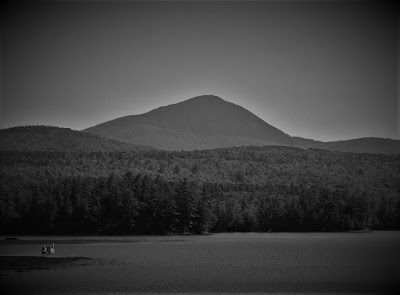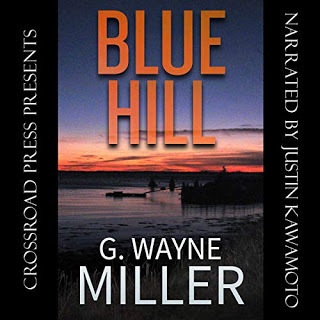The possibility of reconciliation, and an outrageous climb in a Maine Nor'easter. An excerpt from "Blue Hill."
Mark Gray, the protagonist of "Blue Hill," is the son of a now-retired Episcopal priest and '60s social activist. Their relationship has been difficult since Gray's childhood, but there is always the possibility of reconciliation. Maybe it will occur when Gray, now one of America's Most Wanted criminals, visits his elderly father, who lives in Blue Hill, Gray's hometown, and proposes an outrageous climb of a favorite mountain... in a raging Nor'easter. Read the excerpt here.
To learn more about the book, which published on October 6 - and to order in audio, Kindle or paper formats - visit http://www.gwaynemiller.com/books.htm
 The real Mount Blue, near Blue Hill, Maine.
The real Mount Blue, near Blue Hill, Maine.My eye traveled to Mom’s piano: an ancient Kimball uprightthat had been handed down from her grandmother. Mom always dreamed of owning a baby grand, but she never complained that circumstances did not allow her one. What she did was put a pickle jar on the mantel and squirrel away spare change, pennies and nickels, mostly, for her “Steinway Fund,” as she called it. She died before it was full. Dad used what was there to buy her tombstone.
We sat in silence then, for I don’t know how long. I finished my brandy and Dad his and he poured us another. We’d never shared a drink before, never mind two.
“Go on,” he urged, “it’ll fortify you.”
“For what?”
“For climbing Blue Hill.”
I thought he was kidding, or drunk.
But to my knowledge, Dad had never been drunk, and he wasn’t acting it now. He didn’t sound demented. He sounded resolute, as if he’d pondered this a long time.
And there was no mistaking his eyes. They were as steely as the day IRS agents led him out of Saint Luke’s in handcuffs while a photographer for the Bangor Daily News snapped away.
“You’re kidding,” I said.
“No, I’m not,” he said.’
“It’s a blizzard out there.”
“City living’s spoiling you,” Dad said, smiling. “What this is is a good old Downeaster, no more, no less. Now, I intend to climb Blue Hill. If you won’t accompany me—well, I guess I’ll have no choice but to go it alone.”
We parked at the base of the mountain. Dad struggled leaving the car and I doubted he’d have been able to get out if I hadn’t helped him.
“This is worse than when we left the house,” I said as Dad got his balance.
“Maybe to a city slicker.”
“This is crazy.”
“You’ve more than made your point,” Dad said. “Now let’s go—the day’s getting away from us. Don’t lock your doors, I’m afraid the locks will freeze.”
We made respectable progress the first few hundred yards, a stretch that is gently sloped. Dad walked unassisted and the pines surrounding us broke the wind and the snow hadn’t drifted much, was only a smooth three or four inches deep. We nipped from a flask Dad had filled with his brandy and we were determined in our silence.
It was one-thirty on the kind of wintry afternoon when night is impatient to fall.
A bit further, we hit a deadfall.
Dad tried getting over it by himself, but it was too much—even he conceded that after a clumsy try that left him sputtering. I straddled the trunk and as Dad swung his body over, I bore his weight. He was thinner than I remembered and I thought, although it was probably only my imagination, that I could feel the brittleness of his bones.
“Damn arthritis,” he said, then added: “Don’t take that to mean I want to turn back. This is actually easier than I expected.”
A bit further still, we were on an open stretch of mountain. The wind had blown the snow deeper than two feet in places and knocked down pines. A ranger would have had trouble getting through.
“I don’t know, Dad,” I said.
“It gets easier past here,” he declared.
“How do you know?”
“The Big Guy told me,” Dad said.
I grinned, but he didn’t; he really meant it.
“Let’s take a five-minute breather,” he went on, “then give it all we’ve got. We’ll make the top by three.”
We took shelter behind a boulder. Dad drank from his flask.
I wanted to tell him that alcohol and sub-freezing temperatures were a deadly mix, but he’d had his fill of my observations so I didn’t. His face was flush, whether from effort or wind or both I could not tell, but I didn’t mention that, either. I didn’t tell him how worried I was that his gloves, and mine, were soaked. I listened to the wind and it sounded like the wildcats I always imagined awaited us on our family climbs more than three decades ago.
The snow was so heavy that I did not notice, until Dad was set to push off again, that just beyond this boulder was the path leading to Mom’s grandfather’s blueberry field.
I lost my grip bringing Dad over the last deadfall and he surely would have broken his hip if the drift hadn’t cushioned his fall. I said nothing and neither did Dad, but his face showed pain. He put his arm around my waist, and we hobbled on, under a canopy of pines that was strangely still and unblanketed with snow.
Ten minutes more, we reached the summit.
“After all I’ve given Him,” Dad said, “the Big Guy owed me.”




